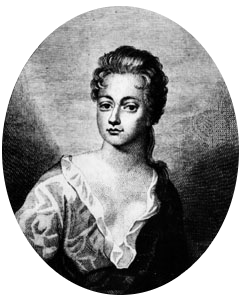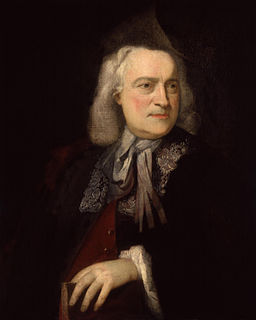
Sir Richard Steele was an Irish writer, playwright, and politician, remembered as co-founder, with his friend Joseph Addison, of the magazine The Spectator.

David Mallet was a Scottish poet and dramatist.

Robert William Elliston was an English actor and theatre manager.

Anne Bracegirdle was an English actress.

The Theatre Royal, Drury Lane, commonly known as Drury Lane, is a West End theatre and Grade I listed building in Covent Garden, London, England. The building faces Catherine Street and backs onto Drury Lane. The building is the most recent in a line of four theatres which were built at the same location, the earliest of which dated back to 1663, making it the oldest theatre site in London still in use. According to the author Peter Thomson, for its first two centuries, Drury Lane could "reasonably have claimed to be London's leading theatre". For most of that time, it was one of a handful of patent theatres, granted monopoly rights to the production of "legitimate" drama in London.

Catherine Clive was a well-known English actress and occasional singer on London stages. She created the role of Dalila in Handel's 1743 oratorio Samson. She also did some writing. A definitive biography of Clive has been written by Berta Joncus.
Events from the year 1706 in England.
Charles Dieupart was a French harpsichordist, violinist, and composer. Although he was known as Charles to his contemporaries, his real name may have been François. He was most probably born in Paris, but spent much of his life in London, where he settled sometime after 1702/1703. A prominent member of the Drury Lane musical establishment, Dieupart was active both as composer and performer and actively participated in the musical life of the city. However, after about 1712 he earned his income mostly by teaching, and in his later years lived in poverty. He is best remembered today for a collection of six harpsichord suites which influenced Johann Sebastian Bach's English Suites.

Owen Swiny was an Irish theatre impresario and art dealer active in London.
Thomas Baker was an English dramatist and lawyer.
Thomas Clayton (1673–1725) was an English violinist and composer, and a member of The King's Musick at the court of William III. His is said to be the first to acclimatise legitimate opera in England.

William Pinkethman(also Penkethman, Pinkeman, Pinkerman, etc.; nicknamed Pinkey) (c.1660–1725) was an English comic actor, a low comedian with a droll style, and theatre manager. He was considered an imitator of Anthony Leigh.
William Taverner was an English lawyer, known as a dramatist.

Letitia Cross was a British singer and actor. She appeared at the Drury Lane Theatre and was the mistress of Peter the Great when he visited England.
Dione is a 1720 tragedy by the British writer John Gay.
The Generous Conqueror is a 1701 tragedy by the English writer Bevil Higgons. It was published in January the following year, and is sometimes dated 1702 by this. Higgons was a well-known Jacobite who had been implicated in the 1696 Jacobite assassination plot against William III. In this play he effectively called for the peaceful succession of the pretender to the throne as James III.
William Burnaby (1673-1706) was an English writer, primarily known for authoring several plays in the early eighteenth century. Three of his works were late entries into the Restoration Comedy tradition.
A Plot and No Plot is a 1697 comedy play by the English writer John Dennis.
Mary Lindsey known as Mrs Lindsey was a British singer. She specialised in comedic roles particularly opposite Richard Leveridge. She appeared in the first all-sung operas in the UK in English.
Jane Lucas was an English stage actress singer of the late seventeenth and early eighteenth century. From around 1693 she was a member of the United Company based at the Theatre Royal, Drury Lane. In 1697 she had fellow actor Colley Cibber arrested, although the reason was not clear and she remained acting in the company alongside him for some years afterwards.









